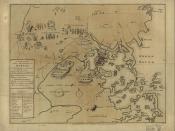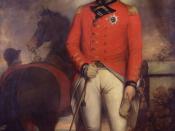Between the years of 1763 and 1776, the worsening relations between the colonies and Great Britain were illustrated by the views colonists had towards the British Parliament and King George III. The first in a series of direct and immediate events within these years, which eventually destroyed the relationship, was the Proclamation of 1763. By prohibiting settlement west of the Appalachian Mountains, England expected to save on administrative costs by controlling expansion. Even though most colonists ignored this law, it angered them because it tried to restrict them. This act lead into a chain of acts including, in 1764, the Sugar Act and the Currency Act, in 1765, the Stamp Act and the Quartering Act, the Intolerable Acts of 1774, as well as many others that aggravated the colonists and caused resentment towards Parliament and the King. The actions of the King and Parliament towards the colonies soon caused a once loyal adherence to authority to degenerate into a hatred, and more so, a justification for the rebellion against the king.
This attitude that the king and parliament were taking advantage of their power over the colonies, is summed up by the Declaration of Independence, '...it is the Right of the people to alter or to abolish ['...any Form of Government (that) becomes destructive of (the natural rights of Life, Liberty, and the pursuit of Happiness)...']...'
By 1763, Britain began to attempt to display more clearly the power King George III and the British Parliament thought they had. This flaunting of authority began with the Proclamation of 1763, which, by prohibiting the settlement of colonists west of the Appalachian Mountains, stirred the feelings of the people, and received a mild reaction. After the more vigorous reactions to the Revenue Act and Currency Acts of 1764, there was an outright...


